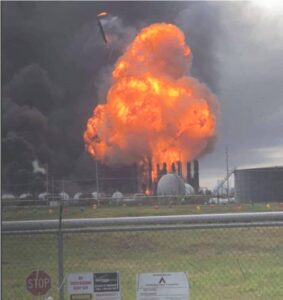The presenters of these two illuminating talks will be sharing cutting-edge content, innovative insights, and key industry forecasts for the year to come
Understanding and Addressing Operational Risk
By Stephen Klejst, Executive Director – Investigations & Recommendations, U.S. Chemical Safety and Hazard Investigation Board (CSB)

The presentation will focus on the key findings from investigations recently completed by the CSB. The Philadelphia Energy Solutions (PES) and Husky Superior investigations provide learning opportunities from incidents involving normal and transient petroleum refinery operations. The Intercontinental Terminals Company (ITC) highlights the importance of recognizing the hazards resulting from the formation of dead legs in chemical production operations. The presentation will conclude with a description of the loss of containment event at the Intercontinental Terminals Company, LLC (ITC) bulk liquid storage terminal. The key safety issues identified in this investigation include mechanical integrity, the adequacy of the hazard analysis process and the importance of a flammable gas detection system and remotely operated emergency isolation valves.
About Stephen:

Stephen Klejst, the Executive Director of Investigations and Recommendations, joined the U.S. Chemical Safety Board (CSB) in February 2018. He is responsible for leading the agency’s investigation and recommendations programs including the Drivers of Critical Chemical Safety Change advocacy program.
Mr. Klejst comes to the CSB after nearly ten years of experience with the National Transportation Safety Board where he was deputy managing director and director of the agency’s Office of Railroad, Pipeline and Hazardous Materials Investigations. During his tenure with the NTSB, Mr. Klejst led the agency’s investigation of several major pipeline and railroad accidents including the explosion of a natural gas transmission line in San Bruno, California, the rupture of a hazardous liquid transmission line in Marshall, Michigan and several significant freight railroad and transit rail accidents. Prior to joining the NTSB, Mr. Klejst had a distinguished executive career in the railroad industry with responsibilities in the areas of safety, accident investigation, regulatory compliance and technical training.
Mr. Klejst received his bachelor’s degree in chemistry from the University of Pennsylvania and a master of science degree in management from the Stevens Institute of Technology. Mr. Klejst is a Certified Safety and Security Director.
The Importance of Operator Training and Preventable Maintenance Programs to Remain Profitable
By Mel Larsen, Becht

Staffing changes as a result of the Pandemic resulted in the loss of decades of legacy knowledge across the operating plant. Operations and maintenance staff are no longer present to offer guidance. At the same time the refinery margins are at an all time high as is the desire to be as safe as possible, pushing on stream operation on both rates and in-service time.
Now more than ever it is necessary and important to review procedures, operator training, and maintenance programs to meet the challenges. The industry is now with a younger generation that came of age with video games, computers throughout schooling, cell phones and other automated systems. The manner of learning of the current generation is very different from the baby boomers that are gone with the inboard 30 years of knowledge.
There are challenges to maintain staff, keeping training fresh and engaged, while keeping the importance of the seriousness of the actions taken daily. Refiners will need to review paper training methods and “on line” systems to be augmented with virtual methods, simulating events to put muscle memory to work.
Culture shifts are in play that are different from the previous baby boomer/ WWII generation. Included in this are language and culture that must be acknowledged and addressed in a positive way to ensure the objective of safe and profitable operations for the next three decades.
About Mel:

Mel Larson is the Strategic Consulting Manager at Becht, with more than 40 years of experience as a Chemical Engineer. His responsibilities include specialty consulting in FCC and serving as Project Manager on various Becht projects. He specializes in assisting companies in analyzing an array of options to meet the strategic objective for sustainability and revenue growth. Mel’s experience includes process troubleshooting and gap assessment analysis in the FCC, Unsaturates Gas Plant, Alkylation and Naphtha Reformer areas. He received his B.S. in Chemical Engineering from Rose-Hulman Institute of Technology, and his hobbies include music, exercise, fine wine, bourbon, and scotch.








Leave a Reply